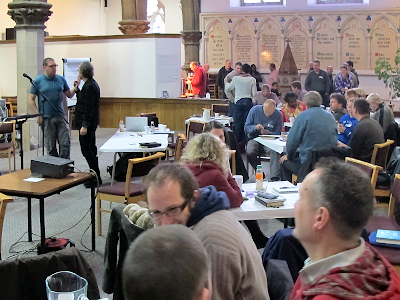 Dave deVries, writing at 'Missional Challenge' a week ago, recommended SOAP Journaling. It seems like a good idea that might help many of us read and digest the Bible more effectively, so I thought I'd pass it on.
Dave deVries, writing at 'Missional Challenge' a week ago, recommended SOAP Journaling. It seems like a good idea that might help many of us read and digest the Bible more effectively, so I thought I'd pass it on.Not only that, SOAP can help with discipling others and if you are doing that (and you should be) it's a technique you can teach them so that they in turn can teach it to others.
Like all simple ways of doing things it's easy to understand, easy to learn, easy to describe and easy to teach.
There is a caveat, however. Like all methods it's what you make of it that counts. There is no benefit or value in going through the motions; methods are tools, not an end in themselves.
So what is SOAP? How does it work? You can read about it in more detail in Dave's article. A brief outline and my own thoughts are below.
SOAP - The acronym stands for Scripture - Observation - Application - Prayer.
Begin by consciously clearing your mind. As with CO2's Virkler, one way to help with this is to jot down in your notebook every intrusive thought about things you need to do. Write things down as they occur to you and dismiss them until later.
Once your mind is clear and calm, ask the Holy Spirit to speak to you, then read the Bible passage from a version that flows easily for you. Consider what you are reading, ask the SOAP questions and write down the thoughts that occur to you.
The questions are listed in Dave's article, he provides several for each letter of the acronym.
Scripture - the questions focus on the context. When it was written, who wrote it, why they wrote it and to whom. Write down verses that speak to you strongly and personally.
Observation - Look for commands and promises. Consider anything concerning the nature and actions of the Father, Son and Spirit. What questions arise in your mind?
Application - What effect does this have, what changes are necessary, what will you do today as a result of what you have read and considered?
Prayer - Aim to cover your needs for help and forgiveness. Be thankful. Write them down as a prayer.
It's easy to read in a vague way and remember almost nothing later. Using a method like SOAP will help you lock in some of the things you read. Writing things down (or sharing them with someone else) are effective ways of getting them to stick in your own mind and heart.
SOAP is more than an acronym, it's an idea. What do you use soap for? To help release the dirt when you wash your hands, to stay fresh and clean. So remember, using SOAP regularly will help you stay spiritually fresh and clean! But as with ordinary soap it's of no value unless you use it.
Questions:
- Are there ways you can improve your Bible reading? Might SOAP help?
- What do you think of the SOAP questions? Can you add more of your own?
- Have you some experience using SOAP? If so, please leave a comment below.
See also:
- Are you listening? - Journeys of heart and mind
- Church of two - Journeys of heart and mind
- Reading the Bible - Journeys of heart and mind
- SOAP
- SOAP Bible reading and journaling - Scripture Engagement
- Start SOAP journaling in 2013 - Missional challenge


